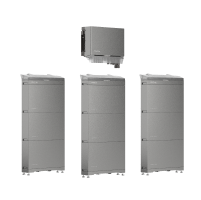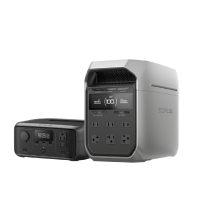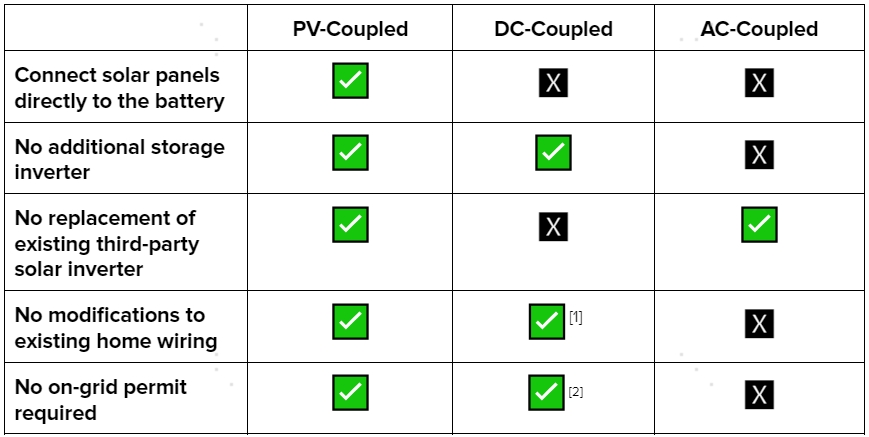AC vs DC Coupled Battery Storage
Solar batteries are a valuable addition to all photovoltaic (PV) module-powered systems.
Off-grid solar power systems don’t work without them.
But adding them to a grid-tied solar panel system also has many advantages — especially when it comes to saving you money on your electricity bills!
PV modules — typically solar panels — capture photons from sunlight using the photovoltaic effect. The panels convert solar energy into Direct Current (DC) electricity.
In residential grid-tied or off-grid solar solutions, an inverter converts the DC electricity into Alternating Current (AC) electricity for household use.
Solar energy is intermittent by nature. Photovoltaic modules of any kind can only capture energy during the day. They don’t work at night and on cloudy days, electricity production will be reduced.
Solar power systems solve the problem of intermittency by storing electricity that’s produced in excess of what’s consumed in a solar battery or batteries.
Traditionally, solar batteries (and most other types of batteries) are either AC-coupled or DC-coupled.
So, what’s the difference between AC and DC-coupled battery storage?
And are there any alternatives for solar batteries?
Read on to find out!
What kind of product or solution are you interested in?



(Source: NREL)
What Is AC Coupling?
Alternating current (AC) is often referred to as household electricity.
The vast majority of consumer applications require AC electricity — the kind you get when you plug into a wall socket in your home.
But batteries store DC electricity.
Even your smartphone has to convert AC to DC to charge.
In an AC-coupled system, a solar inverter converts the direct current from solar panels to AC electricity for use in your home and to send power back to the grid. A storage inverter converts the AC current back to DC for storage.
Converting electricity from AC to DC multiple times results in lower efficiency. Power is lost during the inversion process. AC-coupled batteries tend to have an efficiency of 90–94%, while DC-coupled solar batteries are closer to 98%.
AC coupling has numerous advantages over DC-coupled batteries, but it also has some drawbacks.
Here’s a summary of each.
AC Coupling Advantages
- Supports Emergency Power Backup: One of the most significant shortcomings of grid-tied solar power systems is that without the right kind of battery backup, they won’t work during a power outage. In a blackout, your on-grid system will shut down automatically for safety reasons and to prevent further damage to the grid. By adding an AC-coupled solar battery and storage inverter, you can automatically switch to home backup power in an outage.
- Utility Grid Connectivity: The ability to charge and discharge using AC electricity is the primary benefit of AC-coupled solar batteries. An inverter built into a portable power station or as a standalone component converts DC to AC electricity as needed. Typically, with an AC-coupled battery, you have the option to recharge by plugging directly into a wall socket — not just using solar power.
- Seamless Compatibility for Residential Applications: Many AC-coupled battery solutions offer seamless compatibility with household electricity. Not only can you recharge using PV panels and/or a wall plug, but you can also plug appliances directly into the unit.
- Installation Flexibility: DC-coupled solar batteries typically require proximity to the PV panels that charge them. AC-coupled batteries can be installed at a considerable distance from solar panels in an electrical distribution grid.
- Easier to Retrofit: If you’re switching to solar in a home that’s already been built, AC-coupled systems are significantly easier to integrate with your existing circuit panel and wiring by adding a storage inverter.
AC Coupling Disadvantages
- Lower Efficiency: A small amount of electricity from a DC source like solar panels is lost when the current is converted to AC.
- Higher Cost: Additional components required for AC coupling can make the solar battery system more expensive upfront.
- Potentially Inferior for New Builds: If you’re building a new home from the ground up, the higher efficiency and lower cost may make a DC-coupled solar battery system a wiser choice.
What Is DC Coupling?
Photovoltaic modules like solar panels produce DC electricity.
With a DC-coupled solar battery system, power from the solar panels flows straight to the battery without any AC/DC conversion. In the meantime, the hybrid inverter can also convert DC power to AC power to support your household power usage.
Converting direct current to alternating current always results in at least a minor energy loss. By eliminating a storage-based inverter, a DC-coupled solar battery can potentially store electricity more efficiently.
DC Coupling Advantages
- As with AC-coupled solar batteries, DC-coupled batteries can provide emergency home backup power during an outage.
- By connecting directly to your solar panels, the need for a storage inverter is eliminated
- No AC/DC conversion for storage can lead to greater efficiency
- Viable option for new build houses
- Better able to utilise the battery’s full capacity
DC Coupling Advantages
- Less suitable than AC-coupled batteries for installation in homes with existing wiring
- Significantly more challenging to integrate with the utility grid for a grid-tied system
- Typically more expensive as you must replace your current solar inverter with a hybrid inverter
How Does AC and DC Coupling Work With Solar Power Systems?
Due to the intermittent nature of solar energy, all off-grid solar panel systems require at least one solar battery.
Without a method to store solar energy and supply it at times when the sun isn’t shining, your home would be without electricity when you need it most.
On-grid solar systems don’t require a solar battery. A grid-tied system draws power from the utility grid when solar panels aren’t producing enough electricity to meet your consumption needs.
However, grid-tied systems rely on your utility company. For safety and other reasons, an on-grid solar power system will not function during a blackout or extended power outage.
That’s one reason that many on-grid residential solar system owners choose to add AC or DC-coupled solar batteries to their setup to provide electricity during an outage.
It can also significantly reduce (or eliminate) your electricity bills!
Another reason to add solar batteries to a grid-tied system is if you’re not eligible for net metering or the Smart Export Guarantee (SEG).
In the UK, eligible homes can use the SEG program to receive credits against their electricity bills for any power sent back to the grid when your solar panel array produces more electricity than your household consumes.
If you can’t feed-in excess electricity to the grid — and you don’t have a solar battery to store it — that energy simply goes to waste. Failure to benefit from all of the electricity your solar power system can significantly lengthen your solar payback period and reduce your return on investment.
AC and DC-coupled solar batteries perform the same function — storing electricity for times when your consumption exceeds what your solar panel array can produce. For example, at night. But also during the day when your consumption exceeds your electricity generation and output.

Are There Any Alternatives to AC/DC Coupled Battery Storage?
When it comes to solar energy storage, there is a wide range of battery chemistries available, including:
- Lead acid
- Nickel-cadmium (Ni-Cad)
- Lithium-ion (Li-ion)
- Lithium iron phosphate (LFP/LiFePO4)
Of the above options, the most recent innovation, LiFePO4, offers the best performance, safety, and longest cycle life.
However, up until now, AC or DC-coupled solar batteries have been the only available options for homeowners.
Not anymore.

PV-Coupled Battery Storage
EcoFlow’s groundbreaking PowerOcean DC Fit solar batteries connect directly to existing solar panel arrays without needing any additional components like a storage inverter.
If you’re interested in adding storage to an existing grid-tied residential solar power system, there’s no easier way.

- A change of the wire terminal may be required depending on the output port type of the existing solar inverter.
- Subject to the output power of the new hybrid inverter.
EcoFlow’s groundbreaking PV-coupled PowerOcean DC Fit solution allows you to add industry-leading LiFePO4 solar battery storage technology to your on-grid solar system without replacing your existing inverter or modifying your home wiring.
PowerOcean PV-coupled solar batteries start at 5kWh of storage, and you can expand the system up to 15kWh. That’s enough electricity storage to keep almost any home running after the sun sets.
Not only is installation hassle-free, but you won’t need to apply for a new on-grid permit, which can be an extremely time-consuming and frustrating process.

Adding PV-coupled solar batteries to your existing solar panel system is an excellent alternative to AC and DC coupling when retrofitting storage. You can keep your current solar inverter and don’t need to add a storage inverter.
Adding PowerOcean DC Fit LiFePO4 solar batteries to your existing system can reduce your dependence on utility grid electricity and substantially decrease or eliminate your electricity bills. Over time, your savings will more than outweigh the costs of purchasing the system.
You’ll get 15 years of daily use before hitting 70% of the battery’s original capacity. Backed by an industry-leading 15-year warranty, that’s more than enough time to pay off your system and start making money instead of spending it on electricity bills!
PowerOcean DC Fit makes achieving optimal savings on your utility bills easy. The EcoFlow App and Web Portal give you complete control of your system from anywhere there’s internet. Programming your system to auto-switch between on-grid and solar battery-stored electricity to avoid paying on-peak rates is virtually effortless. If you do require grid power, you can ensure you buy it at the lowest price — at any time of day.
One essential thing to note. PowerOcean DC Fit will not supply electricity during a power outage. Unlike some other storage solutions, the grid must be operational for PowerOcean DC Fit to supply electricity to your home.
If you're looking to maximise your ROI from your existing solar panel array, adding PV-coupled solar battery storage with PowerOcean DC is the ideal retrofitting solution for you.
Frequently Asked Questions
- Which Is Better, AC Coupled or DC Coupled Systems?For solar batteries, both AC and DC-coupled storage systems have their benefits. It really depends on what you’re trying to achieve. AC-coupled batteries are easier to retrofit in an existing home and can also charge using household electricity. DC-coupled batteries are more efficient and suitable for new homes. PV-coupled LFP solar batteries are a new option that’s the best solution for adding storage to an existing solar panel system.

Final Thoughts
Traditional AC and DC coupled batteries have pros and cons.
It’s actually quite simple to decide which one best suits your unique needs.
Once you’ve chosen, look for the best solar battery chemistry and balance of system technology you can afford.
LFP/LiFePO4 batteries give you outstanding performance and longevity. You can buy lead acid solar batteries for less, but they often last only 500-1000 cycles — less than a third of EcoFlow’s PowerOcean.
If you have installed an existing grid-tied solar panel system and want to maximise your electricity bill savings and reduce your dependence on the grid, check out EcoFlow’s PowerOcean DC Fit.
It could be the ideal PV-coupled solar retrofitting solution for you.



